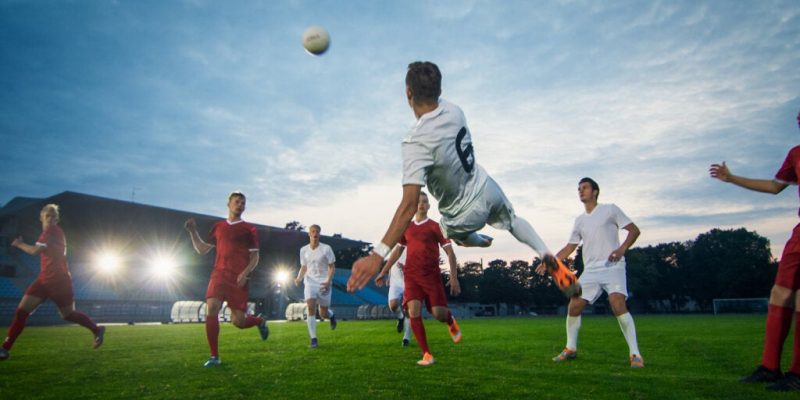Sports hypnosis involves the use of hypnotherapy to help athletes in the treatment of various disorders, both medical and psychological. However, although psychology is gaining more weight in the sports field, in the case of hypnotism, scientific evidence is still being collected. That said, the available evidence points to it being effective.
According to the American Psychological Association, athletes should seek help from sports psychology professionals to enhance their performance, recover from injuries, deal with pressure, stick to programs and, most of all, enjoy what they do.
Hypnosis causes changes in the perceptions, sensations, thoughts, and behaviors of the individual. It’s the same when applied to the field of sports. But, before delving into its possible effectiveness in this area, we’re going to define the process of hypnosis.
Hypnosis
For authors like Ernest Hilgard, the purpose of hypnosis is to create conditions that enhance receptivity and accessibility to suggestion. Hypnosis is a dissociative state of mind. It implies the ability to switch off conscious and unconscious processes.
As a complementary technique, hypnosis is effective but on its own, it lacks effectiveness in the treatment of some disorders. However, combined with other techniques, it seems to work. In fact, it has a place in pain management and anxiety treatment, provided it’s accompanied by cognitive-behavioral therapy.
Similarly, when coupled with other techniques, hypnosis is thought to be effective in the management of obesity and smoking, as well as in the treatment of gastrointestinal disorders. Moreover, hypnosis has proven useful as a procedure prior to surgery. One example is reviewed in the journal, Enfermería Universitaria.
In the field of mental health, hypnosis plays a role in the treatment of depression or post-traumatic stress.
“Hypnosis is a psychophysiological state in which peripheral awareness is reduced and concentration is focused.”
– Spiegel and Spiegel –
You may like to read:
Why We Can All Benefit From Sports Psychology
Sports hypnosis in tennis and soccer
Now we’ve defined hypnosis and detailed under what conditions it can have an influence, we’re going to investigate its role and usefulness in the sports field.
The scientific endorsement of the effectiveness of sports hypnosis continues to grow. As a matter of fact, health professionals currently use the resource for improving performance in disciplines such as tennis or soccer.
In this regard, a study published in Cuadernos de Psicología del Deporte revealed that sports hypnosis not only benefits sports performance but also results in an increase in self-efficacy, concentration, and mood.
In the particular case of tennis, the usefulness of positive autosuggestion when players were serving was evaluated. It was found to be completely effective. Moreover, it reduced the number of double faults the players made.
The aforementioned study by Franquelo et al. alludes to a case in which a footballer had a tendency to exhibit hasty behavior and return the ball too soon. After the use of hypnosis, his performance improved. Hypnosis was also found to help him control his feelings of anger on the football field. Instead, he learned to direct the focus of this irascible emotion toward the ball.
Furthermore, an analysis published in the Journal of Clinical Sport Psychology highlights the efficacy of hypnosis in reducing negative emotions and increasing confidence and performance in professional soccer.
“Hypnosis has elements in common with other psychological training techniques and quite specific components. It works as a secondary strategy insofar as it allows catalyzing or optimizing the impact of the various primary strategies that are applied in the hypnotic situation.”
-Jara and Garcés-
Sports hypnosis in other disciplines
Sports hypnosis is also used for disciplines other than tennis and soccer. For instance, in cycling, it increases resistance in situations of maximum effort.
In basketball, in fusion with other tactics, hypnosis increases the effectiveness of free throws by up to 23 percent. It also plays an important role in basket shooting performance.
On the other hand, in golf, sports hypnosis provides no significant results, beyond helping golfers feel confident, relaxed, and in control. But, in canoeing, when hypnotism is combined with acceptance and commitment therapy, canoeists improve their physical strength. In addition, they increase the number of rowing strokes they perform.

You might be interested in:
Why Should Non-Athletes Care About Sports Psychology?
Sports hypnosis: a promising resource
In light of the previous results, it’s possible that sports hypnosis as a psychological technique can greatly contribute to the improvement and empowerment of the physical and mental abilities of athletes.
Indeed, it’s been suggested that sports hypnosis might be a potentially valuable resource in the field of sports psychology and provide numerous advantages to athletes. However, further research is necessary in respect of defining specific protocols for each individual sports discipline.
The post Sports Hypnosis appeared first on Exploring your mind.



















Comments